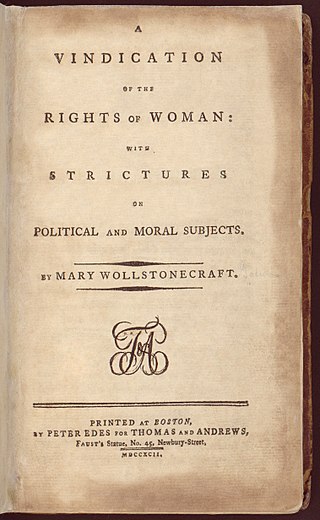
A Vindication of the Rights of Woman: with Strictures on Political and Moral Subjects (1792), written by British philosopher and women's rights advocate Mary Wollstonecraft (1759–1797), is one of the earliest works of feminist philosophy. In it, Wollstonecraft responds to those educational and political theorists of the eighteenth century who did not believe women should receive a rational education. She argues that women ought to have an education commensurate with their position in society, claiming that women are essential to the nation because they educate its children and because they could be "companions" to their husbands, rather than mere wives. Instead of viewing women as ornaments to society or property to be traded in marriage, Wollstonecraft maintains that they are human beings deserving of the same fundamental rights as men.

Jane Austen was an English novelist known primarily for her six novels, which implicitly interpret, critique, and comment upon the British landed gentry at the end of the 18th century. Austen's plots often explore the dependence of women on marriage for the pursuit of favourable social standing and economic security. Her works are an implicit critique of the novels of sensibility of the second half of the 18th century and are part of the transition to 19th-century literary realism. Her deft use of social commentary, realism and biting irony have earned her acclaim among critics and scholars.
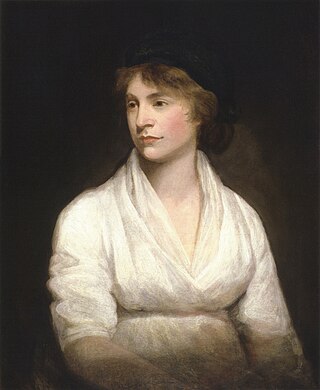
Mary Wollstonecraft was a British writer, philosopher, and advocate of women's rights. Until the late 20th century, Wollstonecraft's life, which encompassed several unconventional personal relationships at the time, received more attention than her writing. Wollstonecraft is regarded as one of the founding feminist philosophers, and feminists often cite both her life and her works as important influences.

Aphra Behn was an English playwright, poet, prose writer and translator from the Restoration era. As one of the first English women to earn her living by her writing, she broke cultural barriers and served as a literary role model for later generations of women authors. Rising from obscurity, she came to the notice of Charles II, who employed her as a spy in Antwerp. Upon her return to London and a probable brief stay in debtors' prison, she began writing for the stage. She belonged to a coterie of poets and famous libertines such as John Wilmot, Lord Rochester. Behn wrote under the pastoral pseudonym Astrea. During the turbulent political times of the Exclusion Crisis, she wrote an epilogue and prologue that brought her legal trouble; she thereafter devoted most of her writing to prose genres and translations. A staunch supporter of the Stuart line, Behn declined an invitation from Bishop Burnet to write a welcoming poem to the new king William III. She died shortly after.

Lucy Cavendish College is a constituent college of the University of Cambridge.
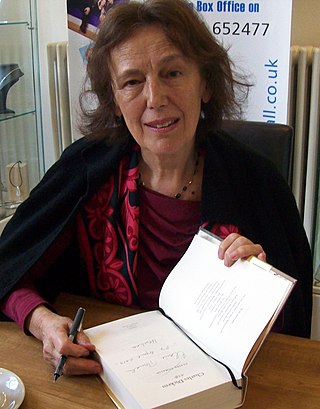
Claire Tomalin is an English journalist and biographer known for her biographies of Charles Dickens, Thomas Hardy, Samuel Pepys, Jane Austen and Mary Wollstonecraft.
Sanditon (1817) is an unfinished novel by the English writer Jane Austen. In January 1817, Austen began work on a new novel she called The Brothers, later titled Sanditon, and completed eleven chapters before stopping work in mid-March 1817, probably because of illness. R.W. Chapman first published a full transcription of the novel in 1925 under the name Fragment of a Novel.

Oroonoko: or, the Royal Slave is a work of prose fiction by Aphra Behn (1640–1689), published in 1688 by William Canning and reissued with two other fictions later that year. It was also adapted into a play. The eponymous hero is an African prince from Coramantien who is tricked into slavery and sold to European colonists in Surinam where he meets the narrator. Behn's text is a first-person account of Oroonoko's life, love, rebellion, and execution.
Mathilda, or Matilda, is the second long work of fiction of Mary Shelley, written between August 1819 and February 1820 and first published posthumously in 1959. It deals with the common Romantic themes of incest and suicide.

Lucy Caroline Cavendish, also known as Lady Frederick Cavendish, was a pioneer of women's education.
Mary Hays (1759–1843) was an autodidact intellectual who published essays, poetry, novels and several works on famous women. She is remembered for her early feminism, and her close relations to dissenting and radical thinkers of her time including Robert Robinson, Mary Wollstonecraft, William Godwin and William Frend. She was born in 1759, into a family of Protestant dissenters who rejected the practices of the Church of England. Hays was described by those who disliked her as 'the baldest disciple of [Mary] Wollstonecraft' by The Anti Jacobin Magazine, attacked as an 'unsex'd female' by clergyman Robert Polwhele, and provoked controversy through her long life with her rebellious writings. When Hays's fiancé John Eccles died on the eve of their marriage, Hays expected to die of grief herself. But this apparent tragedy meant that she escaped an ordinary future as wife and mother, remaining unmarried. She seized the chance to make a career for herself in the larger world as a writer.

Mary: A Fiction is the only complete novel by 18th-century British feminist Mary Wollstonecraft. It tells the tragic story of a woman's successive "romantic friendships" with a woman and a man. Composed while Wollstonecraft was a governess in Ireland, the novel was published in 1788 shortly after her summary dismissal and her decision to embark on a writing career, a precarious and disreputable profession for women in 18th-century Britain.

Maria: or, The Wrongs of Woman is Mary Wollstonecraft's unfinished novelistic sequel to her revolutionary political treatise A Vindication of the Rights of Woman (1792). The Wrongs of Woman was published posthumously in 1798 by her husband, William Godwin, and is often considered her most radical feminist work.
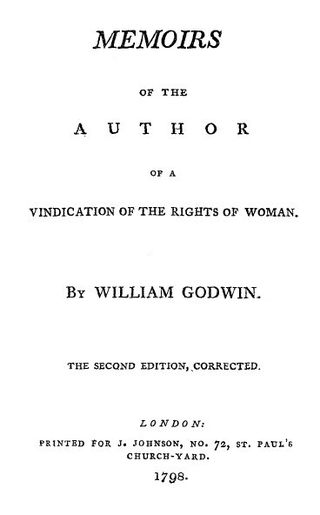
Memoirs of the Author of A Vindication of the Rights of Woman (1798) is William Godwin's biography of his late wife Mary Wollstonecraft. Rarely published in the nineteenth century and sparingly even today, Memoirs is most often viewed as a source for information on Wollstonecraft. However, with the rise of interest in biography and autobiography as important genres in and of themselves, scholars are increasingly studying it for its own sake.

Jane Austen lived her entire life as part of a family located socially and economically on the lower fringes of the English gentry. The Rev. George Austen and Cassandra Leigh, Jane Austen's parents, lived in Steventon, Hampshire, where Rev. Austen was the rector of the Anglican parish from 1765 until 1801. Jane Austen's immediate family was large and close-knit. She had six brothers—James, George, Charles, Francis, Henry, and Edward—and a beloved older sister, Cassandra. Austen's brother Edward was adopted by Thomas and Elizabeth Knight and eventually inherited their estates at Godmersham, Kent, and Chawton, Hampshire. In 1801, Rev. Austen retired from the ministry and moved his family to Bath, Somerset. He died in 1805 and for the next four years, Jane, Cassandra, and their mother lived first in rented quarters and then in Southampton where they shared a house with Frank Austen's family. During these unsettled years, they spent much time visiting various branches of the family. In 1809, Jane, Cassandra, and their mother moved permanently into a large "cottage" in Chawton village that was part of Edward's nearby estate. Austen lived at Chawton until she moved to Winchester for medical treatment shortly before her death in 1817.

Love-Letters Between a Nobleman and His Sister is a three-volume roman à clef by Aphra Behn playing with events of the Monmouth Rebellion and exploring the genre of the epistolary novel. The first volume, published in 1684, lays some claim to be the first English novel. Some scholars claim that the attribution to Behn remains in dispute. The novel is "based loosely on an affair between Ford, Lord Grey of Werke, and his wife's sister, Lady Henrietta Berkeley, a scandal that broke in London in 1682". It was originally published as three separate volumes: Love-Letters Between a Noble-Man and his Sister (1684), Love-Letters from a Noble Man to his Sister: Mixt with the History of Their Adventures. The Second Part by the Same Hand (1685), and The Amours of Philander and Silvia (1687). The copyright holder was Joseph Hindmarsh, later joined by Jacob Tonson.

Mary Wollstonecraft Shelley was an English novelist who is best known for writing the Gothic novel Frankenstein; or, The Modern Prometheus (1818), which is considered an early example of science fiction. She also edited and promoted the works of her husband, the Romantic poet and philosopher Percy Bysshe Shelley. Her father was the political philosopher William Godwin and her mother was the philosopher and women's rights advocate Mary Wollstonecraft.
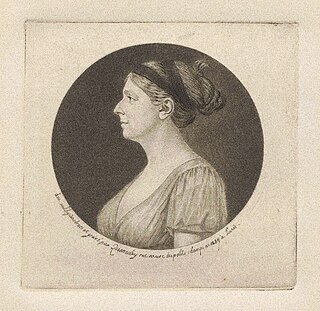
Margaret King (1773–1835), also known as Margaret King Moore, Lady Mount Cashell and Mrs Mason, was an Anglo-Irish hostess, and a writer of female-emancipatory fiction and health advice. Despite her wealthy aristocratic background, she had republican sympathies and advanced views on education and women's rights, shaped in part by having been a favoured pupil of Mary Wollstonecraft. Settling in Italy in later life, she reciprocated her governess's care by offering maternal aid and advice to Wollstonecraft's daughter Mary Shelley and her travelling companions, husband Percy Bysshe Shelley and stepsister Claire Clairmont. In Pisa, she continued the study of medicine which she had begun in Germany and published her widely read Advice to Young Mothers, as well as a novel, The Sisters of Nansfield: A Tale for Young Women.
The Younger Brother, or, The Amorous Jilt is a comedy written by Aphra Behn. The play was first performed and published posthumously in 1696, but was probably written in the late 1680s.

The Young King, or, The Mistake is a tragicomedy written by Aphra Behn. It was probably written during the 1660s, but was not staged until 1679. It explores notions of kingship and divine right, and gender and heroism.















